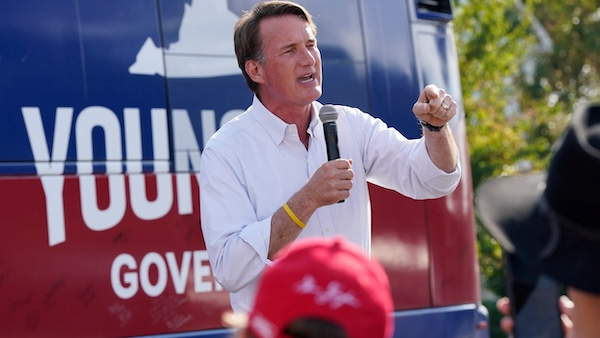It may be an off year for elections, but in addition to a feisty gubernatorial contest in Kentucky, there are vital legislature races to be decided nearby in the Commonwealth of Virginia.
All 140 seats in the state Senate and House of Delegates are up for election next week. Early voting began more than a month ago.
Living just a mile from the state line and working in the political and business community, I’ve enjoyed a front-row seat to signage, policy debates, and assorted information.
Of course, much discussion surrounds popular Gov. Glenn Youngkin, who some hope might make a very late entry into the 2024 presidential race after his strong tenure and surprising blue state victory two years ago. This discussion could further escalate should the GOP sweep the legislative elections.
While conservative media understands but downplays the idea, Youngkin would face logistical difficulties, like ballot access hurdles and perhaps skepticism from Republican voters, who either aren’t familiar with him or are locked into other options who’ve been running throughout 2023.
“I think it’s ill-conceived and a really horrible idea,” my friend and Republican fundraiser Eric Levine told the AP last month about a potential Youngkin candidacy. “It is doomed to failure and will only damage his brand.”
Every seat in Virginia’s General Assembly is on the ballot, and both parties seek a path to a legislative majority in a state that once seemed destined to remain blue yet now hangs in the balance due to Democrat disarray and folks like Youngkin focusing on public schooling issues and working families.
Suppose Republicans manage to hold the House of Delegates and flip the Senate. In that case, Youngkin will have a mandate to enact more common-sense conservative priorities — including tax cuts, abortion limits, the eradication of onerous left-wing energy mandates, and expansion of nuclear — over the final two years of his time in the governor’s mansion. {Virginia uniquely prohibits its chief executive from serving consecutive terms.}
Youngkin, who, despite sophistry from opponents, is not radical, has been successful legislatively and is known for his energetic, amiable style. He launched an early voting push this cycle, shattered previous governors’ fundraising records, and is in the weeds on the specifics of several races, according to his advisers. He is racing around the vast state supporting Republicans — some in unique races — amid a hectic final push.
It’s time to hold the House and flip the Senate. Let’s Go Win! pic.twitter.com/mMHhoMCWIf
— Glenn Youngkin (@GlennYoungkin) October 27, 2023
With all seats in the General Assembly up for grabs Tuesday, Democrats currently have a very slim majority in the Senate, while the Republicans control the House. The election could see one or both chambers flip party control.
While the coming vote clearly has a grand effect on the state, it is undoubtedly still a referendum on Youngkin’s policies and a possible early indication of which direction the winds are blowing for next year’s presidential election or even five years down the road.
“Youngkin is a phenomenal governor and would be a phenomenal president, but this year is a mess due to Trump’s presence and how late in the cycle it is,” a Virginia policy expert who recently spoke to me on background explained. “Youngkin should stand pat, keep putting wins on the board, and be a frontrunner in 2028.”
A statewide race understandably won’t receive the attention that a struggle between good and evil will. Still, as in 2021, perhaps the Virginia results will tell us something as we head into a presidential election year.
‘b




